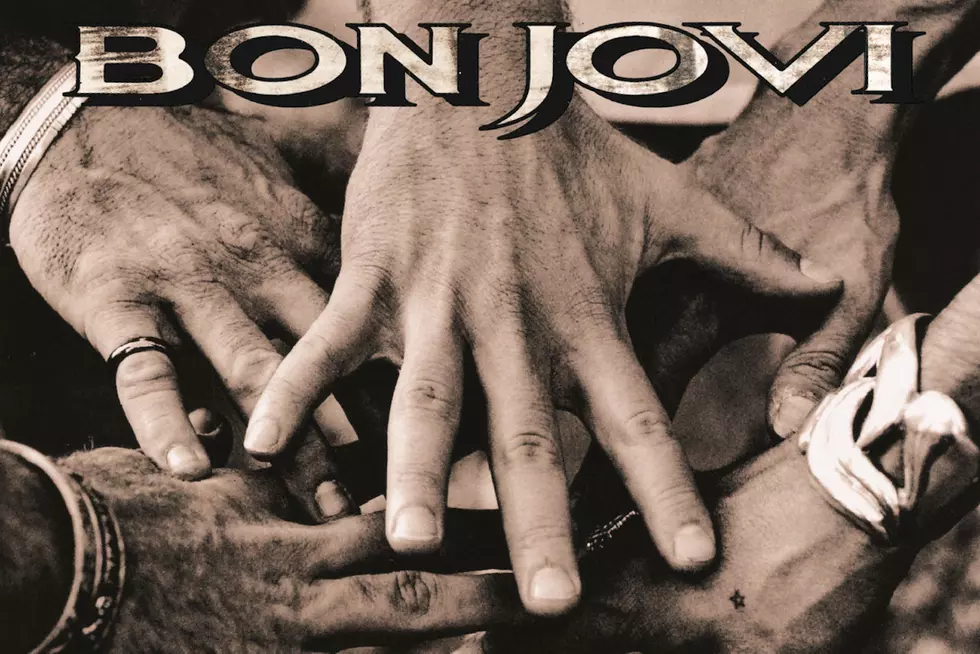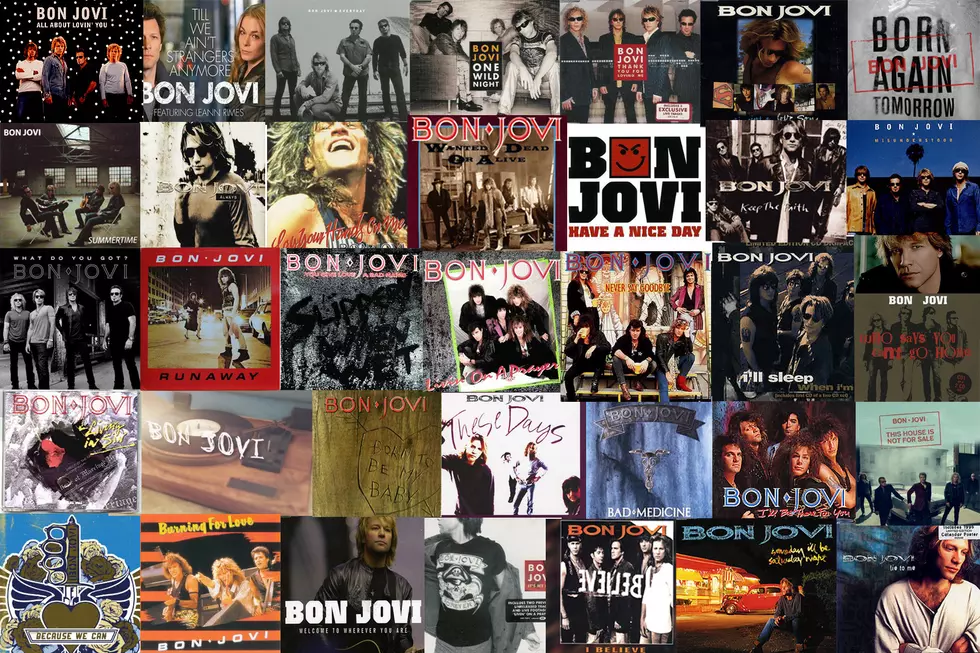
How Bon Jovi Restarted Their Career With ‘Keep the Faith’
Bon Jovi's Keep the Faith, which arrived in stores on Nov. 3, 1992, signaled a new era for the Jersey rockers.
In many ways, this was inevitable. After spending most of the '80s on the road, the band had taken a break after the touring cycle wrapped up for 1988's juggernaut New Jersey. During this break, music trends had moved on from the kind of glossy hard rock and metal at which Bon Jovi excelled. Separately, the members of the band explored different sonic avenues. Jon Bon Jovi landed a solo No. 1 hit, the twang-tinged "Blaze of Glory," from the movie Young Guns II; guitarist Richie Sambora released a solo album, 1991's Stranger in This Town, featuring guests such as Eric Clapton; and keyboardist David Bryan dabbled in soundtrack work.
In a 1993 interview with The Georgia Straight, Sambora credited this break — and the band's individual creative detours — for rejuvenating Bon Jovi. “We needed to find ourselves individually,” he said. “The Bon Jovi situation was extremely successful, and I was very happy to be in a band of that stature, but there was almost nothing left to write about at that point — we were all just so tired and so burnt out. All we were writing about was bein’ on the road and bein’ in a hotel room and bein’ lonely and talkin’ to your girlfriend on the phone. They miss you and you miss them — that was what our lives were about at that time.
“So to actually take a step back and see what was happening in our lives gave us some more stuff to write about. Plus, all of a sudden I was working with people like Eric Clapton and Tony Levin from Peter Gabriel, and Jon was workin’ with Elton John and Jeff Beck, so workin’ with all these different artists gave us different influences, which we brought back to Bon Jovi. It made it fresh and brand-new, and we were excited to be with each other again."
Still, in the time between New Jersey and Keep the Faith, the members of Bon Jovi also nurtured their emotional and personal lives — and addressed the fissures and strains that contributed to the band's exhaustion. Jon Bon Jovi fired manager Doc McGhee and took control of the band himself, forming Bon Jovi Management. More notable, after chatting with Aerosmith manager Tim Collins, Jon Bon Jovi decided to enlist the help of an outside, unbiased mediator to help get to the bottom of the act's deep-seated disagreements.
Watch Bon Jovi's 'In These Arms' Video
"That was a saving grace for the band because we finally had a place where we could be honest and talk to each other about what was good, what was bad and what was indifferent," he told NPR in 2009. "And when you cleared the air and you realized, 'Wow, that was nothing, let's just go and make the next record,' everybody came back with a clear head. We went in two years later and made Keep the Faith."
Making Keep the Faith was a leisurely process that involved going back to their roots by spending time wood-shedding in Bon Jovi's basement. Later, the band decamped to Vancouver to work with Bob Rock, who had engineered and mixed Slippery When Wet and New Jersey. Asking Rock to produce Keep the Faith was an inspired move: The studio guru was fresh off Metallica's Black Album, and so had experience helping hard rock bands navigate the grungier '90s landscape.
And Bon Jovi assimilated quite well, mainly because they stuck to what they did best. "Little Bit of Soul" and the Desmond Child co-written "I'll Sleep When I'm Dead" are laid-back, bluesy struts, like the Stones playing a dive bar in Jersey; "Blame It on the Love of Rock & Roll" is a glammy mash note to (what else?) rock 'n' roll; and "Woman in Love" is a classic Bon Jovi barn-burner with blazing guitars, stacked harmonies and slippery grooves. On the mellower side is "I Want You," on which a protagonist pines for an ex and all but begs her to rekindle their relationship, and "In These Arms" is a soaring pop-rocker that's not too far off from U2's sky-high anthems.
Yet Keep The Faith also took some rather impressive risks. "If I Was Your Mother" starts off like Black Album-caliber thrash, and quickly segues into a quieter section with strings and distorted vocals. The title track is a ferocious mission statement with a propulsive back beat that hewed toward contemporary Top 40. (It's no accident that then-popular electronic band Jesus Jones remixed the song — the seemingly weird pairing made perfect sense.) And the album version of "Dry County" — a mid-tempo power ballad with moody piano, scorching electric guitar and desert-blues acoustic accents — is nearly 10 minutes long.
Watch Bon Jovi's 'Bed of Roses' Video
But Keep The Faith's biggest hit, the Billboard Top 10 hit "Bed of Roses," was the most dramatic departure of all. A power ballad bolstered with Hollywood-caliber melodrama — waltzing piano, seagull-cry guitars, an anguished chorus — it provided a blueprint for the band's move into adult contemporary circles. Not that Jon Bon Jovi was necessarily thinking that far ahead when he wrote it.
"I think that the best songs that come out of honesty are the ones that you're quick enough to write down," he told Cosmopolis in 2002. "For instance, 'Bed of Roses,' when I was writing that song in `92, was in no mood to be writing a song due to the circumstances, and instead of putting the pen down and walking away from the piano, I sat down and wrote, 'Sitting here wasted and wounded with this old piano ... ' and the hurt that I was feeling physically that day."
Keep the Faith peaked at No. 5 on the Billboard chart, but only went double platinum, a far cry from the band's '80s sales milestones. Still, in the U.K., the album was even more successful; six singles landed in the Top 20 of the chart. And, more important, the record showed Bon Jovi that they could survive anything — changing musical trends, business turmoil, personal dust-ups — and come out ahead.
"The genre of music that we were a part of was now going away and, you know, here was this sign of faith, which is all we really had to go forward with," Bon Jovi told NPR in 2009. "We went into the '90s with a clear objective, and that was to believe in each other and have in what it was that we were all about."
Watch Bon Jovi's 'Keep the Faith' Video
Rejected Original Titles of 30 Classic Albums
How a Naughty Moment Inspired Jon Bon Jovi to Learn Guitar
More From Ultimate Classic Rock









